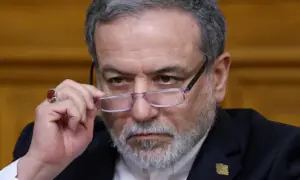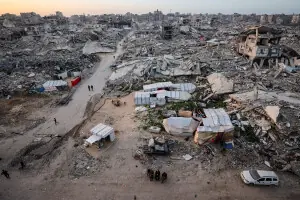'Staying alive' is Islamic State group's new chief's priority
3 min readThe Islamic State group's new leader will have two key priorities, expert Hans-Jakob Schindler told AFP, to keep ties between its multiple subsidiaries -- and simply to stay alive.
The militant group revealed the identity of its third chief since its inception on Thursday, confirming the death of its leader Abu Ibrahim al-Qurashi, more than a month after his demise, and naming Abu Hasan al-Hashemi al-Qurashi as his successor.
According to the White House and US defence officials, Abu Ibrahim al-Qurashi died when he detonated a bomb to avoid capture during a US raid that saw commandos swoop in by helicopter to an area in northwest Syria controlled by rival jihadists.
His demise, during the night of February 2-3 in the town of Atme in Idlib province, was the biggest setback to IS since his own predecessor, the better-known Abu Bakr al-Baghdadi, was killed around 15 kilometres (nine miles) away during a 2019 US commando raid.
Little is known about the new leader himself, but Schindler, senior director at Counter Extremism Project, and a former United Nations expert on militancy, explained what the announcement means.
"Baghdadi, as a caliph should be, was making statements all the time: the result was he died. Qurashi was the exact opposite, not public at all, not communicating except with very few individuals... (but) the result is he died," he said.
"In Afghanistan... only years after he died did the Taliban actually admit that Mullah Omar was dead... for years after his actual death he was still the leader and there were statements coming out!
"Maybe they (IS) were waiting so long because they wanted to go down that road.
"They could have put out a statement saying his death was all lies, and everything would have ticked very nicely along."
"I guess they feel they need a breathing person; maybe too many believed he actually had died," said Schindler.
"There is a bit of a challenge to get a new leader, which you need because you have to get a leader to swear loyalty to.
"That is the only thing that connects East Africa to West Africa to Southeast Asia.
"That is how the network functions... if you're an Islamist movement, somewhere in the region, you need this focal point."
"Strategically ISIS is not doing badly... Africa is a good 'success story'. They have new provinces," Schindler said, using another acronym for IS.
"Afghanistan is going well... any wrong move made by the Taliban, they’ll get more people. They even attacked in Peshawar (in Pakistan) last week, outside of Afghanistan.
"They still have setbacks in South Asia, but as the attacks in Sri Lanka showed, you can still do a lot of damage without having huge number of affiliates.
"You conduct small but horrible attacks, as they do in France. Strategically, ISIS is not doing badly.
"It is a problem that their leaders keep getting killed... and there is not going to be a caliphate any time soon anywhere.
"But, have no doubt, it is still a very viable terror network."
"To stay alive. If you want to die, become ISIS leader -- seriously!
"His function is primarily to keep the network together, and serve as a focal point for the varieties of local affiliates.
"Operational involvement is highly risky. It means you have to communicate with others, and then it is just a matter of time; there was no phone in (the late Al-Qaeda founder Osama) bin Laden's compound, and they still got him.
"Communicating by statement is less of a problem; you do it every two or three months.
"If you have to do dozens of communications, back and forth, getting into details and planning, that is when the risks start."
For the latest news, follow us on Twitter @Aaj_Urdu. We are also on Facebook, Instagram and YouTube.

























Comments are closed on this story.